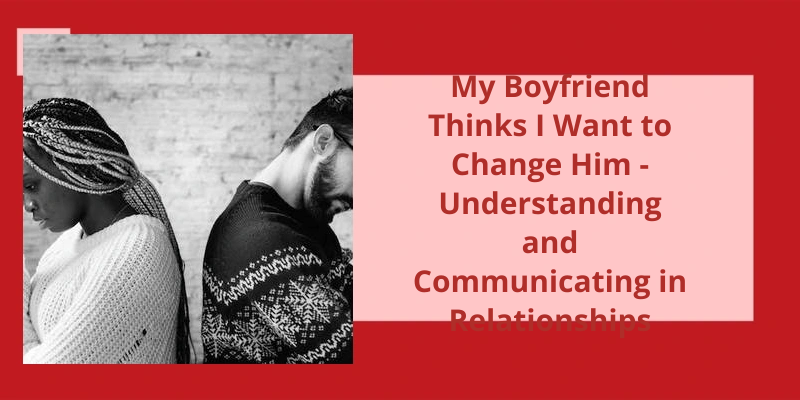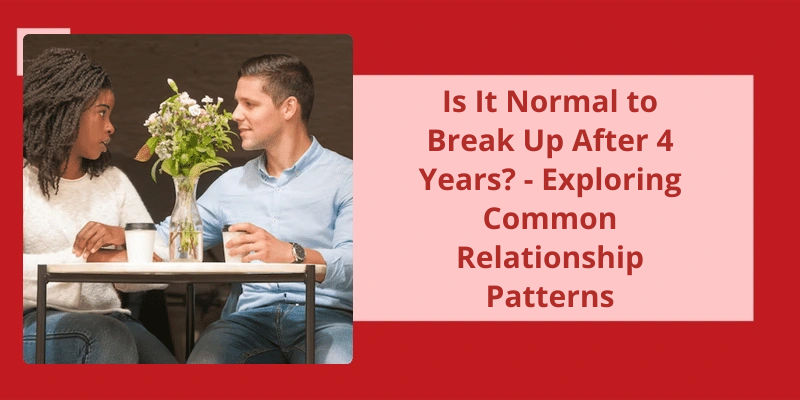Why Would a Guy Want to Change You?
In a healthy and loving relationship, both partners accept and appreciate each other for who they truly are. However, there are instances when one partner may try to change the other. If you notice signs that your boyfriend wants to change you, it could be an indication that he doesn’t truly love and appreciate you for who you are.
Real love celebrates individuality and supports personal growth. If your boyfriend is attempting to mold you into someone youre not, it’s a red flag that he’s trying to control or manipulate you. His intention may be to shape you according to his own preferences or expectations, without considering your own desires or needs. Love should never be about changing someone; it should be about mutual understanding, respect, and growth.
Remember that you deserve someone who loves you unconditionally and appreciates you exactly as you are. You should never settle for anyone who seeks to change or diminish your true self. Healthy relationships are built on understanding and accepting one another, not trying to transform each other. If your boyfriend can’t love and accept you for who you are, it’s clear that he doesn’t deserve you.
Is Trying to Change Someone Bad?
Relationships can be delicate and complex, often requiring understanding and effective communication to thrive. However, the notion of trying to change someone can muddy the waters of a healthy partnership. It’s crucial to consider the intentions behind this desire for change and whether it ultimately benefits or hinders the individual. The truth of the matter is that we can’t forcefully change another person; they must embark on that journey themselves. This impossibility is why attempting to alter someone else isn’t only morally wrong but also simply unattainable.
When we attempt to change someone, we undermine their autonomy and agency. Each person has their own unique set of values, beliefs, and characteristics that make them who they are. The idea of molding someone into a different version of themselves disregards their individuality and can potentially lead to resentment and unhappiness in the long run. Instead of aiming to change someone, it’s essential to focus on understanding and accepting them for who they genuinely are.
Furthermore, attempting to change someone can imply a lack of respect and trust in the relationship. It sends the message that the person isn’t good enough as they’re and needs fixing. This can create a toxic dynamic, eroding the foundation of trust and mutual understanding necessary for a healthy partnership. Instead, nurturing an environment of love, acceptance, and open communication can foster personal growth and encourage positive change.
Rather than trying to change our partners, it’s more productive to focus on self-reflection and personal growth. Recognizing our own desires and needs within the relationship allows for open and honest communication with our partners. By expressing our feelings and concerns effectively, we can collaboratively find solutions and compromises that benefit both individuals involved. This approach promotes understanding and empathy, strengthening the bond between partners.
Source: Is It Wrong To Change for Someone? – The How To Mom
Is It OK to Want Your Partner to Change?
In relationships, it’s natural to have desires for your partner to change certain behaviors or habits. After all, no one is perfect, and we all have areas for growth and improvement. However, it’s important to tread carefully when it comes to wanting your partner to change. While it may be well-intentioned, attempting to change someone can be problematic.
First and foremost, it’s crucial to understand that your partner is an individual with their own values, beliefs, and way of being. They’ve grown into the person they’re today through their unique experiences and perspectives. Asking someone to change fundamentally who they’re can lead to misunderstandings and resentment. It’s important to remember that we aren’t responsible for changing our partner, but rather for accepting and supporting them as they are.
Attempting to change your partner can create a negative cycle within the relationship. When one person feels the need to change the other, it can breed feelings of inadequacy and insecurity. It erodes trust and intimacy, as the focus shifts from accepting and loving each other to trying to mold each other into someone elses ideal. This cycle can be damaging and may ultimately lead to a breakdown in communication and connection.
Effective communication is key in addressing any concerns or differences you may have with your partner. Instead of trying to change them, express how certain behaviors or habits make you feel and listen to their perspective. By cultivating a safe space for open dialogue, you can better understand each others needs and work together towards compromise and mutual growth. Remember, it’s not about changing your partner, but about finding a common ground where both of you feel valued and supported.
However, the decision to change lies within the individual, not their partner. Focus on fostering acceptance, understanding, and open communication in your relationship. By doing so, you can build a strong and fulfilling connection that allows both partners to flourish and grow together.
The Importance of Self-Reflection and Personal Growth in Relationships: How We Can Focus on Improving Ourselves Rather Than Trying to Change Our Partner
- Taking time to reflect on our own actions and behaviors
- Identifying our own strengths and areas for growth
- Setting personal goals for self-improvement
- Practicing self-awareness and self-compassion
- Developing healthy habits and routines
- Engaging in activities that bring us joy and fulfillment
- Seeking feedback and guidance from trusted mentors or therapists
- Understanding that change starts from within
- Communicating openly and honestly with our partner
- Fostering a growth mindset in our relationship
Conclusion
In any relationship, understanding and effective communication are essential ingredients for long-lasting harmony. It’s common for individuals to have concerns about change or adjustments, especially when it comes to personal identity and longstanding habits. Feeling misunderstood can create tension, but it’s crucial to bridge this gap by fostering open and honest dialogue. It’s important to reassure your boyfriend that you cherish him for who he’s and that your intentions revolve around personal growth and shared experiences rather than a desire to change him fundamentally. By cultivating empathy, embracing each other's unique qualities, and finding common ground to explore individual interests together, you can strengthen your bond and create a nurturing environment where personal growth is celebrated. Ultimately, a healthy relationship is built on acceptance, understanding, and the mutual desire to support one another's growth and dreams.






